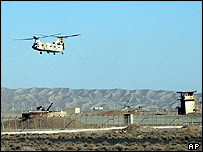
Iran has broken the international seals at the Natanz plant
|
Iran's dispute with the UN and Western countries has deepened after Tehran resumed nuclear research.
As Iran removed UN seals from equipment at Natanz facility, UN nuclear chief Mohamed ElBaradei said Tehran would start small-scale nuclear enrichment.
The move was condemned by the US and European countries, which fear Iran is seeking to produce atomic bombs.
Tehran denies the accusation, saying it wants to produce nuclear energy only.
In a statement from the International Atomic Energy Agency's (IAEA) headquarters in Vienna, Mr ElBaradei said that as well as breaking the international seals on its atomic research centre in Natanz, Iran would before Wednesday remove seals on two other connected sites.
The BBC's Bethany Bell in Vienna says Iran's latest move is expected to trigger an emergency meeting of the IAEA's board of governors.
The board will consider whether to report Iran to the United Nations Security Council. It has refrained from taking that step, but now a referral looks increasingly likely, our correspondent says.
Our correspondent says that although the Iranian enrichment experiments are small scale and just for research purposes, there are fears they could lead to Iranian scientists mastering the art of uranium enrichment.
Depending on the level of enrichment, the uranium enrichment process results in either nuclear fuel or weapons grade uranium which can be used in nuclear warheads.
'Slap in the face'
White House spokesman Scott McClellan said Iran was risking a "serious escalation" in the international dispute.
 |
IRAN'S NUCLEAR STANDOFF
September 2002: Work begins on Iran's first nuclear reactor at Bushehr
December 2002: Satellite photographs reveal nuclear sites at Arak and Natanz; Iran agrees to an IAEA inspection
September 2003: IAEA gives Iran weeks to prove it is not pursuing atomic weapons
November 2003: Iran suspends uranium enrichment and allows tougher inspections; IAEA says no proof of any weapons programme
June 2004: IAEA rebukes Iran for not fully co-operating with nuclear inquiry
November 2004: Iran suspends uranium enrichment as part of deal with EU
August 2005: Iran rejects EU proposals and resumes work at Isfahan nuclear plant
January 2006: Iran removes seals at Natanz facility
|
Mr McClellan said the international community would have no other choice but to refer Tehran to the UN Security Council for possible sanctions.
UK Foreign Secretary Jack Straw also issued a statement condemning Iran's decision.
However, Mr Straw insisted that the problem must be resolved by diplomatic not military means - and he was to meet his French and German counterparts, along with EU foreign policy chief Javier Solana, in Berlin on Thursday to decide their response.
Russian Foreign Minister Sergei Lavrov also said his country was taking "active measures together with the Iranian side in order to keep this [Iranian] moratorium effective".
The BBC's security correspondent Gordon Corera says that Iran's decision to restart nuclear enrichment is a "real slap in the face to the international community".
He said that it was an indication of just how confrontational the country's new regime, led by hardline conservative President Mahmoud Ahmadinejad, is.
The IAEA reported in 2003 that Iran had hidden a uranium enrichment programme for 18 years.
Iran insists its programme is entirely peaceful, and devoted solely to providing nuclear fuel, but Western countries are convinced that Iran, which has huge natural oil and gas reserves, is pursuing nuclear weapons.

